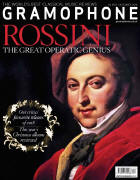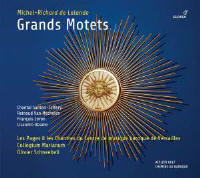Texte paru dans: / Appeared in: |
|
 |
Outil de traduction (Très approximatif) |
|
Reviewer:
Richard Lawrence These three motets were composed for the Chapelle Royale at Versailles: not the present building, but its predecessor. Though the booklet-note rather stretches the point in claiming that they were conceived for today’s chapel, where this recording was made, the acoustic properties are probably much the same: certainly the conductor, Olivier Schneebeli, makes full use of pause and resonance. Lalande was given to revising his grands motets after the death of Louis XIV but here we have the original versions. The earliest piece, De profundis, dates from 1689. The mood is, naturally, predominantly sombre; but there’s a charming passage in the ‘Requiem aeternam’ near the end, where a majorkey, triple-time section suggests that Lalande is in no doubt that the dead will be rewarded with ‘lux perpetua’. The choir’s joyous crescendos over tied notes reinforce the point. Whereas in De profundis verse often succeeds verse without a break, the other two motets are divided into sections. In Venite, exultemus Domino, from 1701, Lalande again confounds expectation. Amid the jubilation there’s a bass solo and chorus, ‘Venite, adoremus’, where a slow tempo and Neapolitan sixth chords convey a sense of awe. ‘Quoniam Deus’ is similarly inward-looking, before the choir breaks in with cheerful counterpoint around a cantus firmus. Another number for bass, ‘Quoniam non repellet Dominus’, is enhanced by oboe and bassoon, while two flutes introduce the weeping curiously absent from the standard English translations. Dominus regnavit, composed in 1704, is in similar mould, with a pleasing variety of mood and texture. Perhaps Schneebelli overdoes the staccato in ‘Illuxerunt fulgura ejus’, but his French choir of children and adults can’t be faulted, and the recorded balance is excellent. The woodwind solos and the rich, Lullian string textures are beautifully handled by Collegium Marianum, an ensemble from the Czech Republic. A little more weight from Lisandro Abadie would have been welcome, but all four soloists sing with a passion by no means alien to Lalande’s operatic style. This is a most distinguished issue. |
|




